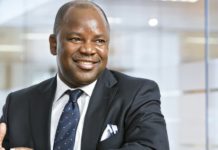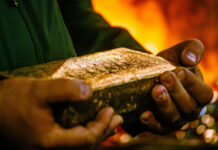
[miningmx.com] — Brian Gilbertson once said that mining companies have to go where the orebodies are. As any seasoned mining firm like AngloGold Ashanti knows, this involves inevitable risk.
AngloGold Ashanti’s problems with Human Rights Watch (HRW) over its operations in the “Heart of Darkness” – the Democratic Republic of Congo (DRC) – underscore yet again the truth implicit in the adage that “Africa is not for sissies.”
HRW is correct – even AngloGold Ashanti CEO Bobby Godsell agrees – in that the gold group’s field staff in Mongbwalu paid an US$8,000 bribe to a local armed militia.
In a perfect world in accordance with AngloGold Ashanti’s stated business policy they should have refused but, guess what? – you would too if someone stuck an AK-47 in your ribs and demanded the money or else.
A bottom-line question raised by the HRW report is whether AngloGold Ashanti should be in the DRC at all.
In a nutshell, HRW reckons AngloGold Ashanti put business considerations above respect for human rights It has asked AngloGold Ashanti to “consider temporarily suspending gold exploration operations in Ituri if such operations require co-operation with the FNI or similar armed groups.”
Godsell rejects the accusations over human rights but has effectively agreed to HRW’s request with his commitment to pull out if his exploration staff find themselves again in the situation where they have to pay bribes to operate safely.
But he upholds AngloGold Ashanti’s right to be in the DRC in the first place because of the huge economic and social benefits that a gold mine would have for the local and national economy if one is eventually developed.
“The crux of the matter is whether the development of a gold mine would be good or bad for the peace process in the DRC. We believe the answer is yes but not if you have to give succour to armed groups. We agree that there should be no economic activity if we have to pay bribes,” he said.
Godsell rejected the argument that companies should stay out of the DRC until the democratic process in the country has reached its end point. He drew parallels between what is going on during the present period of transition in the DRC and the situation in South Africa between 1990 and 1994.
“The DRC government sees economic growth as an integral part of transformation and the African Union encourages it,” he says.
That’s a powerful ethical argument but there is, of course, another practical reason for early involvement in the DRC. Any mining company waiting until conditions are perfectly stable in the country is going to be too late to realise the kind of commercial benefits that are there for the taking now. The good projects will almost certainly be grabbed by competitors.
But going after them now is a high-risk, high-reward gamble. It is one that has already been taken by companies like Adastra and Metorex whose executives are no doubt thanking their lucky stars that their copper/cobalt operations are situated in stable Katanga which is more than 2,000 kms south of the trouble in Ituri.
Question repeatedly asked at the press conference by foreign media was why AngloGold Ashanti did not realise that conditions in Ituri were not conducive to normal business.
Answer was the group consulted extensively with the DRC government and the UN before going in but conditions then changed suddenly. That’s an answer which anyone who has been exposed to the uncertainties of operating in third-world African countries – let alone former war zones in those countries – should accept.
There appears to be a lot of sympathy for AngloGold Ashanti’s situation from fellow mining operators with one criticism being that the group was naive in not having an armed security force protecting its field camp.
Answer from AngloGold Ashanti is that it is not allowed to have armed guards because that would be equivalent to running a private army which is banned in the DRC by the UN.
“Get real” is the retort from one DRC mining operator. “We have never paid a bribe and that is only because we have an armed guard force recruited from DRC citizens who are allowed to carry weapons.”
Like they say – Africa is not for sissies.











